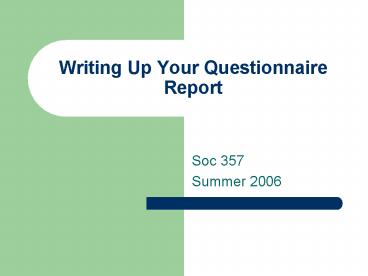Writing Up Your Questionnaire Report - PowerPoint PPT Presentation
1 / 20
Title:
Writing Up Your Questionnaire Report
Description:
Interesting does not necessarily mean statistically significant! ... Eating Habits Index Mean Score. Gender. Example: Correlation Matrix .452 .045. Age. Correlation ... – PowerPoint PPT presentation
Number of Views:48
Avg rating:3.0/5.0
Title: Writing Up Your Questionnaire Report
1
Writing Up Your Questionnaire Report
- Soc 357
- Summer 2006
2
Writing up your research
- You can choose to write up your findings
separately or in a group - Every individual must write a group process
report, AND HAND IT IN SEPARATELY, regardless of
whether you write the paper in a group or by
yourself
3
A Note on Format
- Please make sure to include the same subject
headings listed in the instructions - Please label each subsection with the appropriate
letter (by request of our grader)
4
General Principles
- Your report should be detailed enough so that
somebody else could replicate your entire process - If you think you could have done something
better, you must - State what it was
- State how you would fix it
5
Writing up Sampling
- Describe WHEN, WHERE and HOW you selected your
subjects - Think about the coverage biases in your sample
discuss differences among team members - Discuss external validity how representative of
the general population - Evaluate was it well done (given limitations of
course)? What would you have done differently?
6
Remember!
- Bias vs. subjectivity subjectivity refers to
someones personal view bias refers to some
non-random element of a sample (systematic
exclusion of some people or groups from the
sample) OR to question wording that is likely to
systematically exclude a particular response
7
Writing up Variables
- Descriptions of every variable were your
measures valid? Would you change the questions? - Discuss problems
- Question wording/type E.g. Religion
- Issue of low variability discuss whether you
think this is due to - Actual presence in the population
- Bias in the sample
- Bias in the question
8
Evaluating Validity of Index
- Be sure that you understand and can describe how
the DV Index was created - DV_Index DV1 DV2 DV3 DV4
Each persons score on the Dependent Variable
Index is the SUM of all his/her answers to the DV
questions
9
Evaluating Validity of Index
- Part A Frequencies
- Discuss variability problems
- Low variability on some items in your index
- Whether some items have very different
distributions from each other
10
Evaluating Validity of Index
- Part B Open-ended question
- - How did you categorize it/sort answers?
- - Did it work on giving you an overall idea of
the persons opinion? - - Did it elicit information that was not
captured by your DV Index items?
11
Evaluating Validity of Index
- Part C Compare Open Question results with DV
Index - If you coded the answers to the open-ended
question, were they statistically associated with
the DV Index? - IF you coded it on a scale, are the two
correlated? - IF you coded it into categories, are there
differences between the mean scores in each
category?
12
Correlation Between Open Question DV Index
Iraq War Attitudes Questionnaire Open Ended
Question Coded Attitudes along a continuum of
Agree(1) to Disagree(5)
13
Difference of Means for Open Question Categories
DV_Index
Organic Foods Questionnaire - Index measures
how much people are into organic food - Compare
mean Index scores for each category of the
independent variable
14
Evaluating Validity of Index
- Part D Correlations Reliability Analysis
- Explain
- 1. Whether all your items have medium-strong
positive correlations with each other - 2. If not, why not question wording, different
idea, biased sample? - 3. Whether removing any of the items from the
index would improve the Coefficient Alpha of your
index.
15
Part 4 Results
- 1. Discuss in general the results of your index
which items worked well, which didnt, and why
you think this was the case
16
Part 4 Results - Hypothesis Testing
- 2.Prepare a bivariate statistical table to show
the relationship between your most interesting
independent variable and the dependent variable
index. Interesting does not necessarily mean
statistically significant! - Prepare a difference of means table, or a
correlation matrix - Write a paragraph discussing your statistical
results saying what they show and whether your
hypothesis is confirmed, disconfirmed, or
inconclusive.
17
Example Difference of Means Table
18
Example Correlation Matrix
19
Hypothesis Testing!
- Inconclusive vs. disconfirmed results
inconclusive means predicted direction, but weak
association if you have zero association, your
hypothesis is disconfirmed if you have
association in the wrong direction, your
hypothesis is disconfirmed.
20
Goals for Today
- Discuss each part of the report with your group
- You dont have to agree on how to interpret
everything































